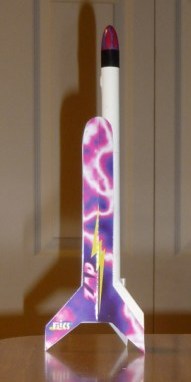| Published: | 2010-08-15 |
| Manufacturer: | Modification |
 Brief:
Brief:
The Lucky 13 is a copycat of Hans "Chris" Michielssen’s Powered FLICS. Mine uses the FLICS body and the remnants of a damaged 13mm 4FNC rocket that was missing its nose.
Modifications:
I didn’t have any 13mm tubing so I dug through my box-o-dead rockets and found a suitable 13mm one. After I removed two of the fins, I held it up to the assembled FLICS body and liked what I saw. That is, I decided to leave the two remaining fins. The rocket was missing its shock cord so I mounted a piece of Kevlar twine through the body wall opposite the remaining fins. I scuffed the paint off and then glued it into the ‘V’ of the FLICS body. I found an unused Hartle Engineering resin cone and attached it to the Kevlar leader using the rubber band that came with the FLICS. I attached a small plastic streamer and was basically done.
I wasn’t very concerned with the stability of my MicroMaxx FLICS but decided to build a RockSim 9 model of this one. The FLICS body was easily modeled as as set of custom fins mounted to a ‘pod’. As built, the model seems to be marginal so I attached a tiny clamp-on fishing weight to the wire hook that’s embedded in the Hartle cone’s base. I later noticed that I had the Barrowman stability method selected vs. the RockSim method. This is a common mistake for me because prior versions wouldn’t allow the Barrowman method for designs that use things like single fin components (or, in this case, pods). Anyway, after selecting RockSim, the stability margin improved enough that I wouldn’t have needed the extra weight. However, I decided to leave it on since this rocket isn’t designed for performance anyway. The final specs for my version of the 13mm Powered FLICS are 9.625” long and 0.64 oz.
The only part that required finishing was the cone. I painted it red with blue trim to somewhat match the FLICS color scheme. I really wish that I had one of the Shuttle-themed FLICS but sometimes you just have to use what you have.
Construction:
- One FLICS kit
- One damaged 13mm rocket (8.25”)
- One Hartle Engineering resin cone
- Kevlartwine
- Small lead fishing weight
Flight:
I added a square of wadding and repacked the plastic streamer. The A10-3 was friction fitted. The boost was fast and went cross-wind. This was likely due to the odd geometry of this model. There was no damage despite the landing on a gravel road.
Summary:
I had no interest in the FLICS as a rubber band powered rocket but was happy to find a way to use them for powered flight. I must be easily amused because I really liked this build. It looks a bit funny...which is right up my alley. It seems to fly well enough and definitely garnered a few chuckles from the people around the RSO table.
Other Reviews
- Modification Powered FLICS By Dick Stafford (August 1, 2010)
When I read that Hans "Chris" Michielssen had converted a Quest FLICS rubber band powered rocket to MicroMaxx power, I immediately gave it a try. I too have had a stash of these freebies with no plans for what to do with them. I wasn't going to review this...er...rocket but, when I saw his review of a 13mm version, I thought, "why not?" I've also built a 13mm version but haven't had a chance ...
- Modification Powered FLICS By Hans "Chris" Michielssen (July 19, 2010)
I received a few Flic rockets as "freebies" in Quest orders. My younger daughter has played with them, launching them with the provided rubber band stick. On the powered Flic attempt, I mounted an Alien-X Decor Flic on a Quest MMX-2 body tube. This body tube didn't extend over the top of the cardstock Flic. I flew it with a MMX engine to the BIG altitude of 25 feet. The second ...
#Related Reviews
- Modification Powered FLICS By Dick Stafford
When I read that Hans "Chris" Michielssen had converted a Quest FLICS rubber band powered rocket to MicroMaxx power, I immediately gave it a try. I too have had a stash of these freebies with no plans for what to do with them. I wasn't going to review this...er...rocket but, when I saw his ...
- Modification Powered FLICS By Hans "Chris" Michielssen
I received a few Flic rockets as "freebies" in Quest orders. My younger daughter has played with them, launching them with the provided rubber band stick. On the powered Flic attempt, I mounted an Alien-X Decor Flic on a Quest MMX-2 body tube. This body tube didn't extend over the top of the ...
Related Products
 |
 |